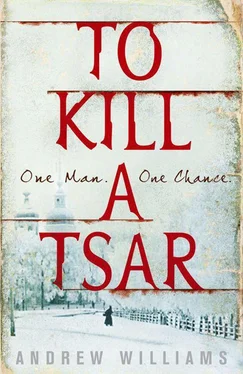‘Mr George Dobson?’ she asked in Russian.
‘Yes.’
‘May I come in?’
‘Who are you?’
A gloved finger to her lips, she whispered ‘Inside’.
Her face was very thin and white, the skin a little loose over the bone. She had thick dark eyebrows, a broad nose and a small mouth with a full lower lip and a thin Cupid’s bow upper. She was not beautiful but striking, and even in the darkness there was a pale brilliance to her blue eyes that startled him.
Flummoxed by her boldness, he stepped back into the hall. She followed him at once but waited until the door was closed and bolted before she spoke.
‘My name is Anna Kovalenko,’ she said, and she pulled off her gloves and held out her hand in a very English way.
‘Hadfield’s… But you’re in prison.’
‘No. I am standing in your hall.’
Dobson leant forward a little as if gaping at an unusual zoo animal. ‘They let you go?’
‘Of course not!’ she said shortly. ‘Can we talk somewhere else?’ And without waiting for an invitation, she set off down the hall in search of the drawing room.
‘What are you doing here?’ he asked crossly as he followed her. ‘Did anyone see you?’
‘No one saw me.’
She took off her coat and hat and dropped them on his couch. Her hair was cut short and in the gaslight she looked thin and severe in a plain black dress.
‘You should draw the curtains.’
‘How can you be sure?’
‘Mr Dobson, I have been a revolutionary for a number of years.’
He plodded to the window and closed the drapes while Anna cleared newspapers from an armchair by the fire. ‘I expect you know why I’ve come here?’
‘No,’ he said, slumping into the chair opposite. ‘And frankly I would rather you weren’t here. How did you escape?’
‘It’s not important. At Krasnoyarsk on the way east — with the help of the party.’
‘Is there still a party?’
She gave a small smile: ‘The correspondent with all the questions. I haven’t come to talk about the party.’
‘What have you come to talk about?’
She turned to look at the fire as if to compose herself, its flickering shadows playing across her cheek and neck. And when she looked at him again there was a sadness in her eyes and in the weary lines of her face that spoke of loss and pain and desperation. He knew why she was there and she knew he knew.
‘My comrades have been looking for her,’ she said. ‘But you will understand how difficult it is for friends of mine to make inquiries.’
‘Yes. But what can I do?’
‘You know people. The British embassy…’
He stared at her for a moment then, rising from his chair, made his way over to the samovar and began to spoon tea into a pot.
‘It would be easy for a correspondent to visit these places without suspicion,’ she said.
His back was to her and she did not see his wry smile.
‘Is that all?’ he asked, turning with the tea tray: ‘Why me? There are Russian journalists. I don’t know you.’
She coloured a little: ‘You’ve heard of me.’
‘Most of St Petersburg has heard of you. Here—’ and he handed her a glass.
‘Have you tried?’ she asked tentatively.
Dobson did not reply but stood at the fireplace blowing the steam from his glass, his high pink forehead wrinkled in a thoughtful frown.
‘He’s your friend,’ she added quietly.
‘Can’t you speak his name?’
She turned to look at the fire again, lifting a small hand to her face but not before he noticed her lip tremble.
‘I want to find my daughter. Will you help me?’
‘And Frederick feels the same.’
‘I know he feels the same,’ she said quietly. ‘That’s why I’m here. My friends tell me you visited the Rauchfus Hospital and the orphanage on the Moika Embankment.’
‘Yes. I’m doing what I can to find the girl.’
‘Sophia. That’s her name,’ she said sharply, turning to look at him again.
‘The state has given her a name, Anna Petrovna, but we have no idea what.’
‘We?’
‘Frederick has other friends.’
Anna nodded. Her lips were pursed, an intense frown hovering between her eyes, as if battling to hold deep feelings in check.
‘It is impertinent of me, but do you still have feelings for him?’ Dobson asked.
She stiffened, her shoulders narrowing, her hands turning in her lap: ‘He must forget me…’
Dobson took a sip of his tea, watching her over the top of the glass. Then lowering it back to the arm, he said, ‘I’ve told him to forget you. You know you’ve ruined his reputation.’
If he was expecting her to demurely acquiesce he was very wrong.
‘He made his own judgements. I tried to warn him. He knew I was… I will always be with the people. The struggle is not over. It is only a question of time.’
‘Yes, well, I have no respect for murderers, no matter how they dress up their crime. You’re only sitting here still because I’m still a friend of Frederick’s — for all his misguided loyalties.’
‘Then I’ll leave.’ She began to rise.
‘Sit down.’
She stared at him for a moment, a gleam of resentment and barely disguised hostility in her eyes, then sank back to the edge of the chair.
‘Frederick is besotted with you. Sophia and, yes, you, Anna Petrovna, are all that seem to matter to him.’
She turned her head from him again in an effort to disguise the emotion written deeply in her face. ‘When did you last hear…’ She could not finish her question.
‘Today. We walked together. I’ve told him not to leave his rooms by day but the damn fool does what he likes.’
‘You mean he’s here?’ Anna leant forward in astonishment, her arm outstretched as if to touch him, and a kaleidoscope of feelings from delight through concern to anger flitted across her face: ‘Why is he here? Why?’
‘Didn’t you listen? He wants you and your child.’
‘He must leave. Go back to Zurich. Tell him. Please.’
‘Don’t you think you should tell him?’
She hesitated, biting her lip anxiously: ‘Will he want to see me? I will write to him.’
‘Be my guest.’
She rose and made her way over to Dobson’s desk, where she scribbled a note on a sheet of his writing paper. When she had finished, he helped her into her coat and led her back along the hall. She pulled her scarf over her nose and mouth, drawing his gaze up to her pale hypnotic eyes.
‘And you will do what you can to help?’
‘I am already. But you must not visit me here again.’
‘Thank you.’ She looked at him more softly.
He bid her farewell then watched her from his window as she hurried across the frozen street into the city’s shadows.
The following morning Dobson woke in his clothes with a throbbing head and a wooden mouth. Rolling from his bed, he stepped over to the window and drew the curtain aside a little. There was a light covering of snow in the street and the civil servants and better sort of merchants who lived on Malaya Italyanskaya were hurrying to work in clouds of vapour. A smart blue carriage with the arms of a noble family was waiting at the door of the mansion opposite. He had no idea what a police spy would look like but drew some comfort from the absence of anyone hovering in a doorway. An hour later, he stepped on to the street in his oldest coat and walked as briskly as he dared to the cab rank outside the Mariinskaya Hospital, cursing in English under his breath: ‘Damn the fellow.’
The principal focus of Dobson’s displeasure was sitting at the window of an attic room in a seedy looking house in the Izmailovsky district. Hadfield’s hair was shorter, his beard fuller, and he was wearing a pair of simple wire spectacles with round lenses that made him appear intensely serious. To his neighbours he was a Volga German in his late twenties called Karl Schmidt, who had been enterprising enough to move in search of a better living in the capital. He was careful, a little distant in a Lutheran sort of way, and but for a portly foreign gentleman he received no visitors. He took few meals and his landlady was never quite certain when he was at home. But on that bright November morning the maid found him at the window, a newspaper on his knee, staring through the dirty panes at the rooftops of the city. The room was cold and he was wearing several layers beneath a jacket and scarf. She cleared his dirty dishes and left him with some tea. On the stairs she passed his foreign friend, pink in the face and breathing heavily as he hauled himself up with the aid of the banister.
Читать дальше












